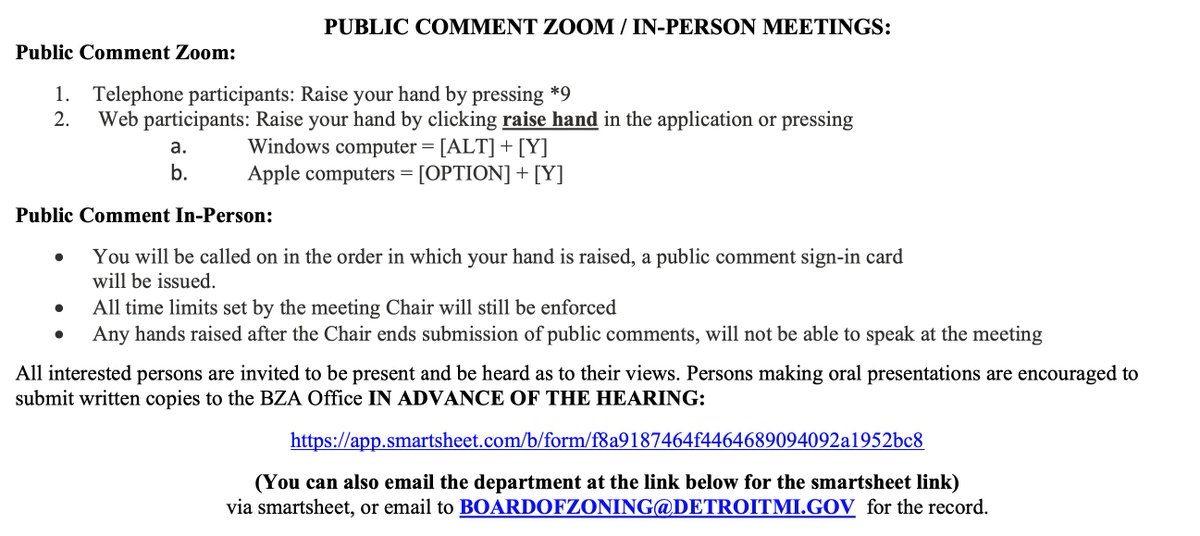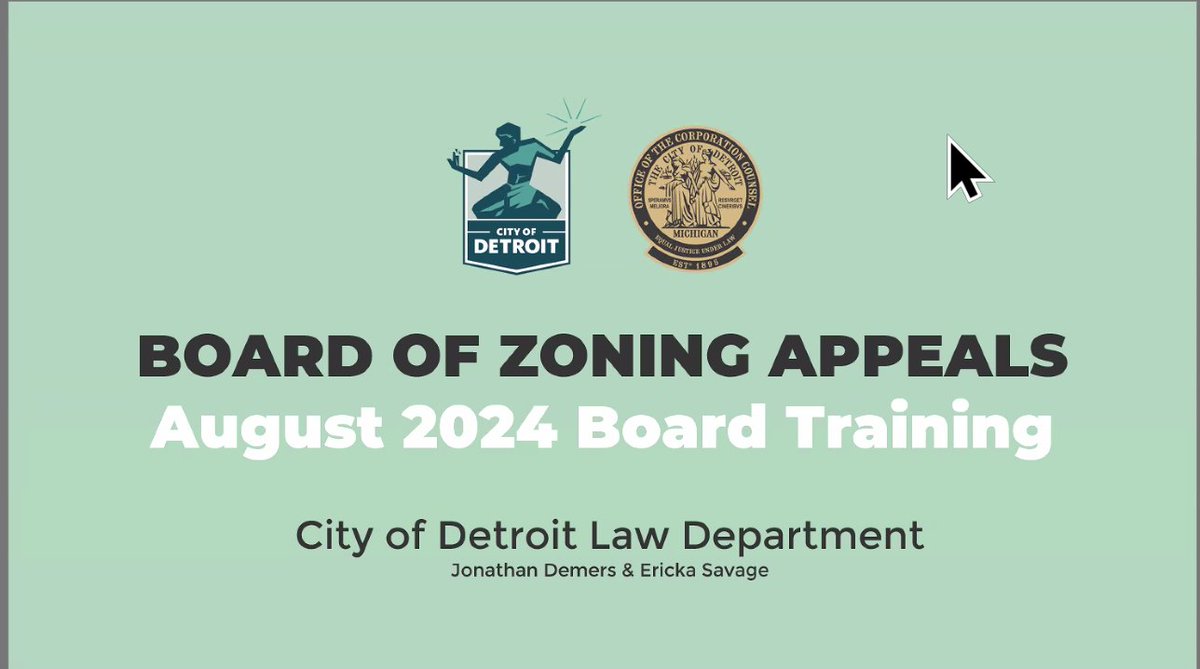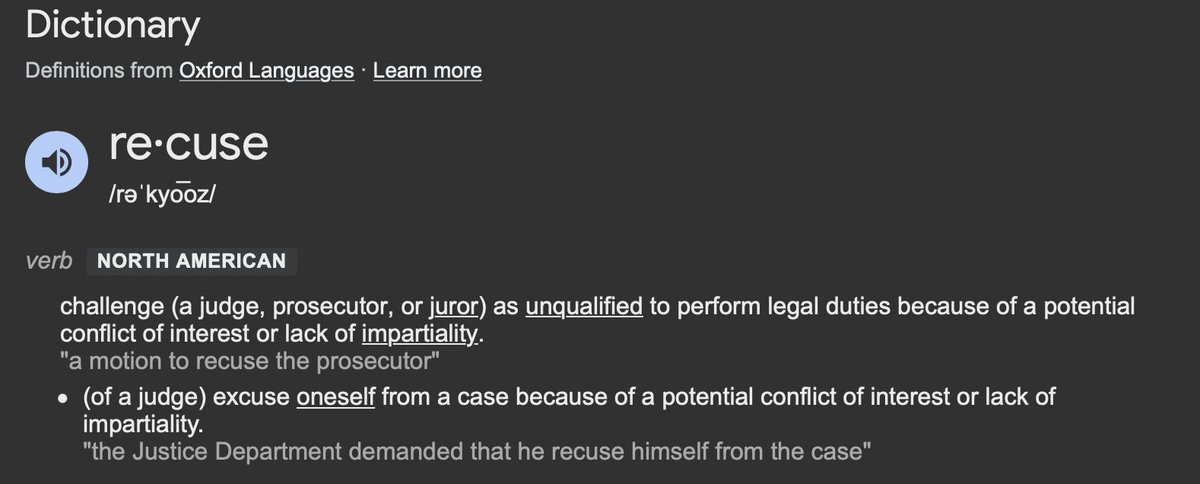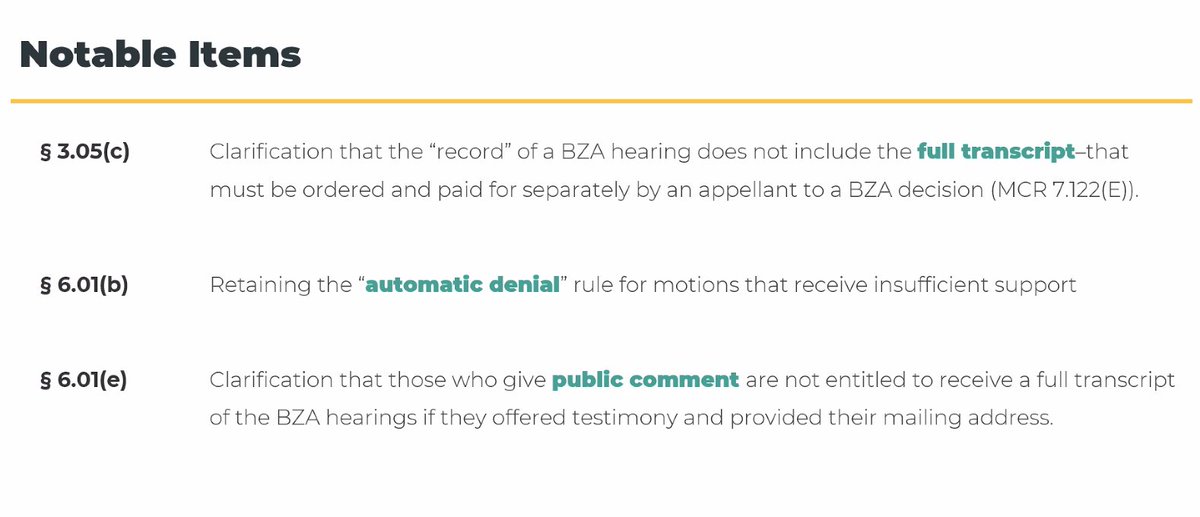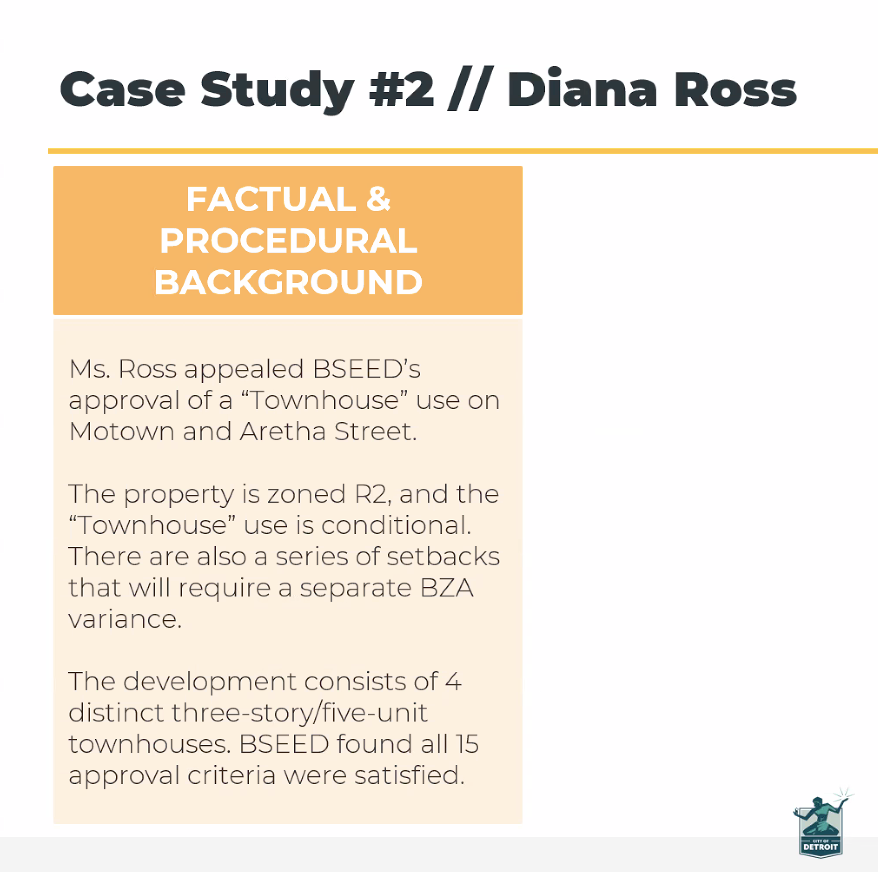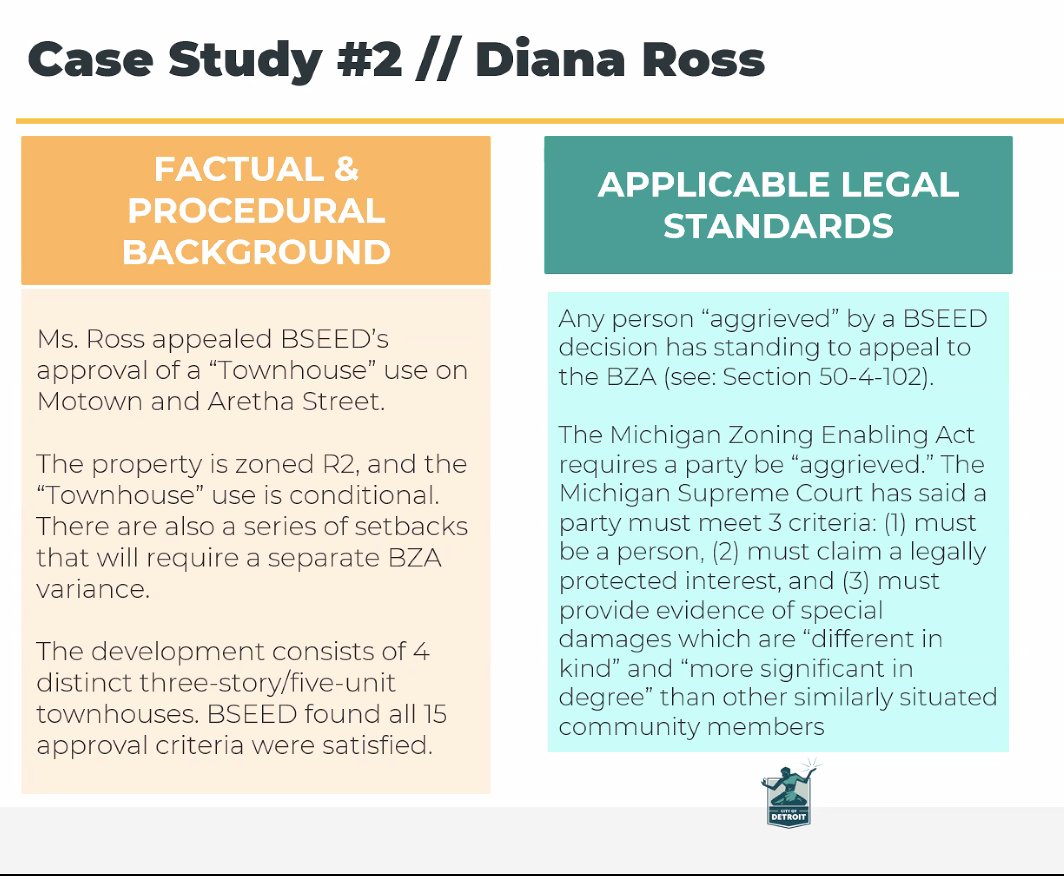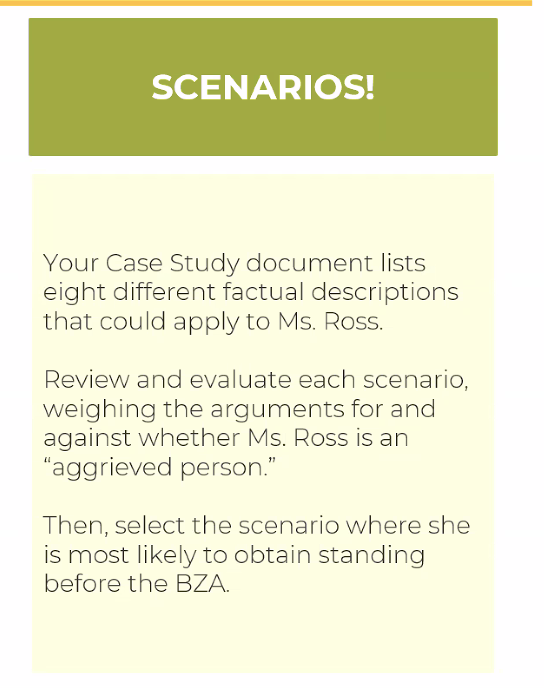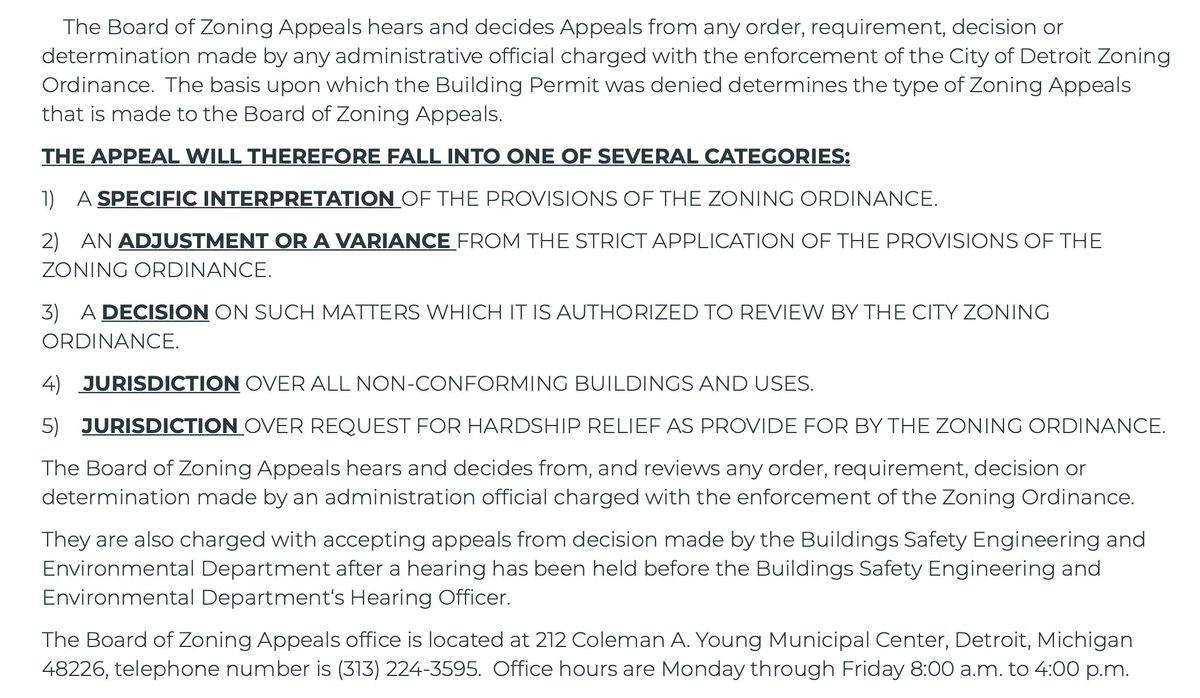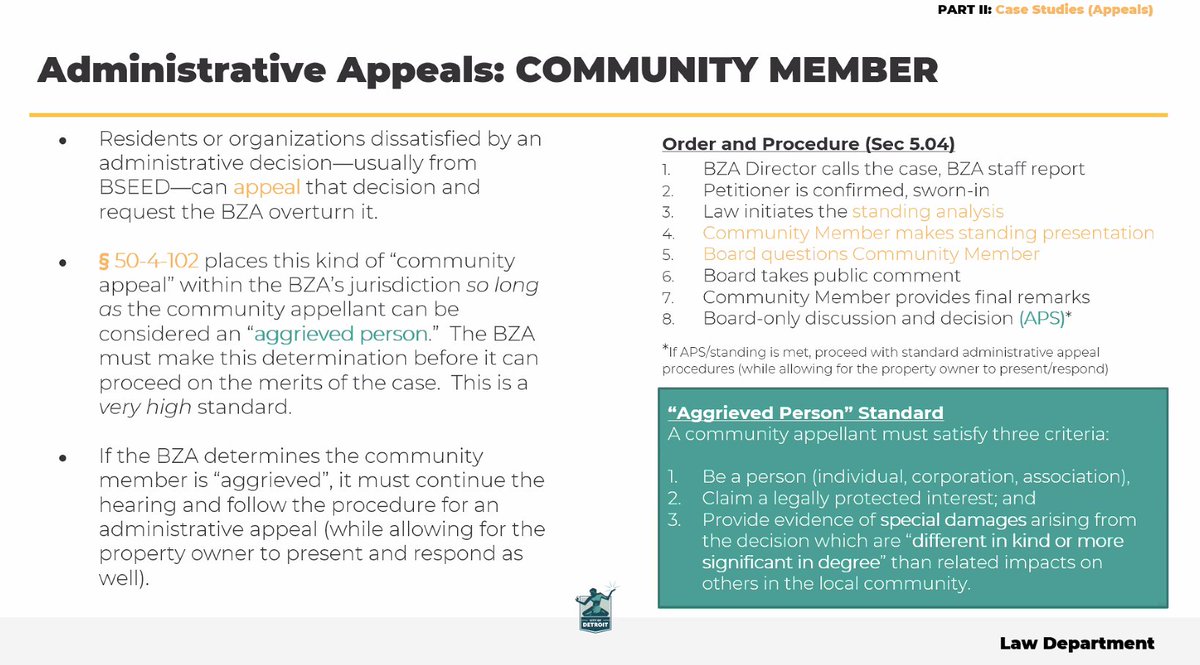Live reporting by
Meghan Rutigliano
Law Department presents proposed changes to the Rules of Procedure for board members to review. Updates are largely based on the recent change from seven to nine board members.
Hi Detroit! I’ll be live-tweeting the Detroit Board of Zoning Appeals (BZA) mtg at 9am today on behalf of #DETdocumenters. @DetDocumenters media partners: @BridgeDet313 @chalkbeatDET @freep @metrotimes @michigan_public @media_outlier @PlanetDetroit @wdet @wxyzdetroit
07:48 AM Aug 26, 2024 CDT

The meeting is being hosted at Coleman A. Young Municipal Center, 2 Woodward Avenue, Suite 212, Detroit, Michigan 48226

The public is invited to join in-person, by Zoom, or via phone. For phone and Zoom information, visit: detroitmi.gov/sites/detroitm…
detroitmi.gov/sites/detroitm…

IMPORTANT: If you believe anything in the coverage today is inaccurate, please email us at documenters@outliermedia.org with "Correction Request" in the subject line.

To view the full agenda, visit the same link as above: detroitmi.gov/sites/detroitm…
detroitmi.gov/sites/detroitm…

There will be time allotted for public comment. Here are the instructions.


The official training for Board members is going to happen today. Male speaker is talking about attendance. He's saying that board members will be prepared via email, on screen at meetings about the appeals being presented.

He's also saying that he wants board members to attend meetings in their districts, to communicate with their city council members and build a rapport. -Robert's Rules of Order will be used at meetings. -Meetings will be recorded. -Read staff reports carefully.


He's saying we have authority to impose conditions as an appeals board but we are not problem solvers. Close out discussions so as not to leave room for further discussion for cases. Don't try to fix problems by allowing folks to "run red lights".

Here are the current board members: PART 1 of 2 Robert E. Thomas Chair Council District At Large Robert Roberts Vice Chairperson Council District 6 Scott Boman Council District At Large Robert G. Weed Council District 1 Kimberly Hill Knott Council District 2

PART 2 of 2 Elois Moore Council District 3 Jerry Watson Council District 4 Byron Osbern Council District 5 Anthony Sherman Council District 7

Question regarding petitioners. Can they mandate that petitioners come in person? They're talking right now about OPEN MEETINGS ACT!

Ribbron is saying not sure if they can mandate that a petitioner come in person. They can discuss together moving forward.

They're going to proceed with BZA Board member training while simultaneously having bagels and donuts and coffee. Mmm. 🍩🥯☕️ Sounds like a plan!

More about the Open Meetings Act: legislature.mi.gov/(S(jc2bbf55nvg…
legislature.mi.gov/(S(jc2bbf55nvg…


Ta-Da! This training is officially happening now. Speaker is Jonathan Demers from City of Law Department. He's sharing that there's the presentation on the screen, that they have handouts, a booklet, and binders, 2 copies of rules and procedures (redlined version and clean copy).


A key change is that the Board of Zoning Appeals (BZA) is making is that the BZA membership move from 7 board members to 9 board members. These and other changes will have to be proposed in a public hearing (at a future date) before they are passed.

For the new, updated board of 9 members, BZA has to have a vote of 5 for a motion to pass.

They're now discussing Ethical Duties and Conflicts of Interest. Essentially walking through it so it's clear between them what they're agreeing to.

They're really getting into nuances of how to discern whether they have a bias, conflict of interest. Also, Malfeasance.

Discussing how they would "recuse"themselves and how that affects the quorum.

Q: When should a board member disclose a potential conflict of interest? A: If you find that you will be biased, do so at the point of decision-making after the hearing.

Now they are discussing how to use motions effectively! If you are seeking a motion to approve a request for a nonconforming use change/hardship, you should have confidence that you are going to get 5/9 votes, otherwise it will be a denial of the appeal automatically.

This is a very interesting open meeting. That we the public are getting insight into the board training for BZA is just super cool. Thanks, @DetDocumenters for this assignment. I'm learning so much.

@DetDocumenters In the absence of BZA's approval, the appeal is denied. Zoning law is biased against change. The reason is that the burden is on the appellant to change the zoning ordinance.


@DetDocumenters Correction: More specifically on this one (), the burden is on the appellant to make a compelling argument for the ordinance to be questioned or not followed exactly, for the appeal to be granted. https://x.com/MotorCityMegs8/status/1828077450246717785

@DetDocumenters They're discussing community engagement, community support, and whether groups have done outreach as a factor or not a factor in decision-making process.

@DetDocumenters The BZA does not need to enforce zoning. They're saying it's difficult to enforce certain types of conditions.

@DetDocumenters Back to Community engagement/outreach: there may be adverse effects on the community that an appellant has not considered. This is why the board might want to ask about community engagement efforts done before appearing before them.

@DetDocumenters Absent community opposition, they don't see how they can deny a project based on engagement? Personal opinion: Ooof. I think community engagement related to zoning appeals should be a must as far as appealing a decision. That's me.

@DetDocumenters They're saying that petitioners/appellants who are smart/savvy should have already done community outreach.

@DetDocumenters OK, now they are on Case Studies. Legal teams are presenting cases to show what the plan was, the appeal was, and how the BZA decided.

@DetDocumenters To appeal, you have to be "aggrieved", have an actual legal interest in the project. Simply living somewhere is not enough.

@DetDocumenters They're looking at a packet (which I can't see) to review "fact patterns". 1) Are they aggrieved? This is the first order of business. 2) Should we hear their appeal? based on the scenarios and fact patterns.

@DetDocumenters They're discussing whether Diana Ross qualifies as an aggrieved person. Very interesting process happening around how they make decisions, what the criteria are, what are the grounds for the appeal, etc.



@DetDocumenters 3 Prongs: 1. Who is the appellant? 2. Do they have a legally-protected interest? 3. Has that interest been damaged in some significant way?

@DetDocumenters Usually the petitioner will meet both #1 and #2 but #3 will usually always be a discussion to determine and decide.

@DetDocumenters Credit due: Ericka Savage has been taking them through the criteria and answering their tough questions.

@DetDocumenters Now they're talking one another through the decision-making process and what the communication flow will be DURING the appeals process. When they'll discuss things, when they'll make a motion, etc.

@DetDocumenters They are discussing when they can review the next two case studies. They will meet in November again on the case studies. They will receive approval criteria list with each case. They will also receive suggested questions they can ask to determine aggrieved person statuses.


@DetDocumenters Female Public Commenter: When it comes to letters of recommendation, public comments are not being included in the documentation. Response from Board: When it comes time for BZA hearing, please send to BZA Department directly.

@DetDocumenters Irritated Public Commenter is shouting and asking to have a chance to speak. Uh oh. They just abruptly ended the zoom meeting without letting the commenter speak (hand was raised in the Zoom).

@DetDocumenters yeah, unfortunately, they did not officially adjourn or let the public hear that the meeting was being adjourned. The Zoom abruptly ended at 11:59am with a commenter asking to be heard that was not acknowledged. Oversight or not, correct procedure did not seem to be followed🤷♀️


@DetDocumenters This concludes my coverage of the Detroit Board of Zoning Appeals (BZA). For more information, visit the BZA site here: detroitmi.gov/events/board-z…
detroitmi.gov/events/board-z…

